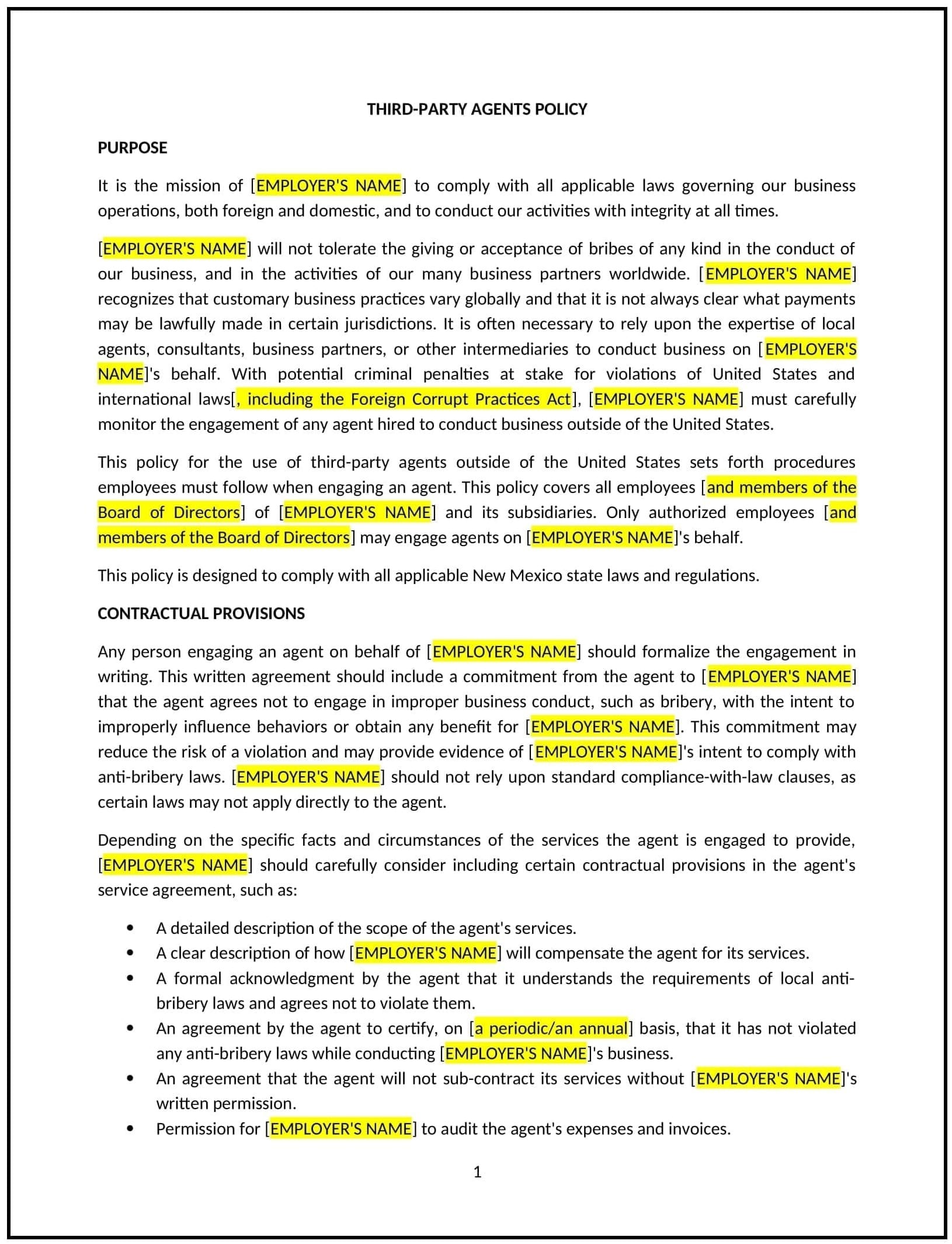Third-party agents policy (New Mexico): Free template
Got contracts to review? While you're here for policies, let Cobrief make contract review effortless—start your free review now.

Customize this template for free
Third-party agents policy (New Mexico)
A third-party agents policy helps New Mexico businesses define and manage their relationships with external vendors, contractors, or service providers. This policy outlines key procedures for selecting, monitoring, and managing third-party agents to ensure business operations are streamlined, compliant with state-specific regulations, and aligned with company values. It is designed to foster transparency, mitigate risks, and promote responsible business practices when engaging with third-party agents.
By implementing this policy, businesses in New Mexico can improve operational efficiency, reduce risks associated with third-party relationships, and maintain a secure and transparent approach to managing outsourced services.
How to use this third-party agents policy (New Mexico)
- Define third-party agents: Specify what constitutes a third-party agent, including contractors, vendors, and service providers who perform work on behalf of the business.
- Set criteria for selection: Outline the requirements and qualifications third-party agents must meet before being engaged, such as experience, financial stability, and legal compliance.
- Establish contractual agreements: Ensure that contracts with third-party agents clearly define roles, responsibilities, deliverables, and expectations.
- Monitor third-party performance: Implement regular evaluations and performance reviews to ensure third-party agents meet agreed-upon standards and comply with the terms of the contract.
- Address risk management: Define procedures for identifying and managing potential risks, such as data security concerns, non-compliance with state laws, or conflicts of interest.
- Implement confidentiality agreements: Include non-disclosure clauses to protect sensitive business information shared with third-party agents.
- Outline termination procedures: Specify the conditions under which a third-party relationship may be terminated, including breaches of contract or failure to meet performance expectations.
- Ensure proper documentation: Keep records of all third-party agent agreements, communications, and evaluations for future reference and accountability.
Benefits of using this third-party agents policy (New Mexico)
This policy provides several benefits for New Mexico businesses:
- Promotes transparency: Clear guidelines for managing third-party agents help businesses maintain transparency and avoid misunderstandings.
- Reduces risks: By setting clear expectations and monitoring performance, businesses can minimize the risks associated with outsourcing services.
- Supports legal compliance: The policy helps businesses navigate New Mexico-specific regulations governing third-party relationships, ensuring adherence to state laws.
- Enhances operational efficiency: Businesses can improve their workflows and operations by ensuring that third-party agents perform at the expected level.
- Protects sensitive information: Confidentiality agreements help safeguard intellectual property and proprietary business information shared with third-party agents.
- Promotes accountability: Clear performance evaluation processes encourage third-party agents to meet or exceed expectations and maintain high standards.
Tips for using this third-party agents policy (New Mexico)
- Communicate expectations clearly: Ensure third-party agents are fully aware of their responsibilities and the company’s standards from the outset.
- Review contracts regularly: Periodically assess the terms of third-party contracts to ensure they reflect the current scope of work and compliance with New Mexico laws.
- Monitor performance: Establish regular checkpoints to evaluate the work of third-party agents and address any performance issues early.
- Secure sensitive data: Use confidentiality agreements to protect sensitive information shared with third-party agents.
- Keep thorough records: Document all agreements, evaluations, and communications with third-party agents for accountability and transparency.
- Stay updated on local laws: Keep up to date with New Mexico regulations regarding third-party relationships and adjust the policy as necessary.